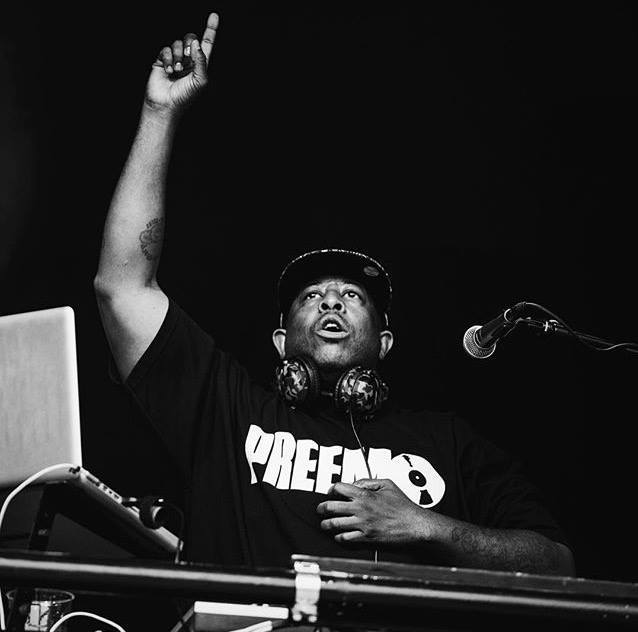
Legendary producer DJ Premier talks vinyl’s role in the history of hip hop, DJing today and his massive record collection.
DJ Premier knows more about vinyl than we can ever dream to. Joe Woods chats to the legendary record producer, DJ and one half of Gang Starr to find out how vinyl has helped shape hip hop, the power of album artwork and his favourite records of all time.
Vinyl was central to 90s hip hop culture, how do you think it helped with the creation of the genre?
The culture of hip hop was born from hard times on the street, a lack of affordable recording equipment and instruments to create music. Kool Herc may have not done it how DJs do it now, and it may have been off time and off beat, but he took two copies of the same record, and extended the part we call the break, which is most people’s favourite part of the song, and that was the early stages of sampling. Repeating the part that we really like to hear, even if it’s just a bar, made people go, ‘damn, that’s hot! This guy is experimenting!’
They just played it over and over, so the crowd can enjoy the song for longer. Then all of a sudden, an MC is like ‘yo keep that going, play that part again’. This was way before the professional stages of hip hop, but it still helped to shape the art form of what we did to make the record last a whole different life. Without vinyl who knows if hip hop would have even came about at all, but it’s still such a big genre of music after all of these years.
What makes vinyl so special? Why have you not chosen to switch over to digital in recent years?
Well for a few years I was using CDJs, and then I felt weird not doing it the vinyl way, so I went back to doing it the vinyl way! I use Serato but I’m still doing it with turntables, still moving the needle, its all about really caring about the vinyl aspect of turntablism. Not that everybody should have Serato and Traktor, you should have to qualify for it, just like how you have to qualify for a credit card, or qualify to buy a new car.
The credit check would be like ‘have you ever held a record, have you ever scratched on a turntable? No? Yo get out of here then, you can’t use Serato!’ That would put a stop to microwave DJs, like these stars and movie actors who get paid $50,000 to do a gig, but when you put them behind a turntable they suck! They ruin the party, because they don’t know how to bring the next record in and their timing is off. The computer can hold 10,000 records, but if you take that computer away what can you do? Go and grab a crate of records and keep the party going, can you do it? No! I think that I actually need to be the President of Serato credit checks! 
When searching for new music to sample and play live, do you still go into record shops and think, ‘that vinyl’s artwork looks good, I’m going to try that’?
Absolutely! That’s still fun for me, I’m 50 years old and the same passion I had going into it then when I was 19, is the same passion I still have now when I’m 50. I make beats, I still compete, and always have new stuff coming out all the time from pop to alternative, but I always make my underground jams. As long as I like it, and it’s got a good vibe, it doesn’t matter if you don’t like it.
Records that were used to scratch and sample back then, were records that we had in our household. Our household had Barry White, Al Green, Curtis Mayfield, Aretha Franklin, Natalie Cole and anything Motown, that’s standard in any black household. If you’re surrounded culturally by your own race, and that’s all you see on the album covers, that’s what you will identify with; but I was always looking for artists who were bringing out good music, with that dope vibe, like The Eagles with Hotel California, so I used to play that, along with Carly Simon, the Bay City Rollers, AC/DC and Rush, y’know? I like that, I like the way it felt. But then hip hop came out and I liked the way it felt too.
I was born in 1966 and music was so pure back then, there’s no way of putting how great it is, and now we are hearing a lot of artists who aren’t so pure, so of course you get disappointed. It does not hold up to what I was fed, and nurtured on. It’s like giving me yellow milk, I don’t like yellow milk! I want the old white milk from a cow! And now I don’t want milk from a cow, but that’s what I was nurtured on.
You’ve worked with some amazing people over the years, from Nas to Kanye West. Is there anyone else that you want to tick off that list, and have you got any projects currently in the pipeline?
I’d like to work with Ghostface Killah from Wu-Tang Clan, I’d like to do a whole Wu-Tang album! As well as Alicia Keys, Mary J. Blige and Sting, I’d love to do a dope album with him! I wish I could’ve worked with Prince too; I’m a Prince junkie. He left behind so many great records, and original things, I’m still mesmerised by it and he touched my heart a lot. I’d also like to work with James Brown, George Clinton, Ice‑T, The Bomb Squad, Rick Rubin and Larry Smith to name a few.
Right now I’m finishing up a mix for an artist called Torii Wolf, we have a new single that is out right now called ‘1st’. I’ve got some underground stuff rolling too, I produced a whole album for NYGZ, who are part of the Gang Starr Foundation, and it’s a straight, raw street album. I also executive produced MC8 from Compton’s Most Wanted’s new album, which is called ‘Which Way Is West’, and I did three songs on there, but the album is really really dope!
There has been a real resurgence in sales of vinyl recently both sides of the pond, why do you think this has happened?
You can’t ever kill off something that is supposed to be here, vinyl is supposed to be here because it’s the pure sound of music. CDs are just too clean, crispy and compressed, which I dislike because I am a purist of sound as I was raised on tape and analogue. With album covers, they’re like a big book, you can open it up and look at the pictures, the artwork, and people have put real time into the artwork. I still feel respect for the artwork and entire package that you sell, and vinyl has that presence and that imagery. That’s why I like Jack White of The White Stripes, he’s got a mobile vinyl store that he takes to his shows.
But hip hop has kept vinyl alive. I used to work in a record store, and hip-hop vinyl was always rockin’, it always sold, and kept on getting requested and to this day, it’s still a big deal in the vinyl world.
We’ve already touched on your musical tastes, but what was your first ever vinyl purchase and what are your top-five must haves?
My first ever vinyl was ‘I Want You Back’ by Motown, it was a 45 that my mother got for me. I remember putting it on the machine, putting the arm on top, and suddenly the needle drops, lands on the beginning of the record and it’s like, ‘how does it know to move that far and land at the beginning of the record? What are the mechanics behind this!?’ My top five records would be Eric B. & Rakim’s Paid in Full, Boogie Down Productions by Criminal Minded, Dirty Mind by Prince, AC/DC’s Back In Black and Ice Cube’s AmeriKKKa’s Most Wanted.
DJ Premier comes to Arts Club Liverpool on Saturday 25 June and performs alongside KRS-One at O2 Forum Kentish Town on Friday 15 July as part of a series of summer European dates.
[ Source: https://academymusicgroup.com/artsclubliverpool/blogs/believe-hype-dj-premier-and-vinyl-revival ]
Rishma
Latest posts by Rishma (see all)
- INTERVIEW | TRELL SAVONE: FROM BUNKIE TO THE WORLD WITH “SHINE” — June 30, 2025
- NEW MUSIC | MCSOLOMON AND DERAJAH ‘KINGSTON TO LONDON’ — June 30, 2025
- REDMAN RETURNS TO THE UK THIS SUMMER FOR HIS LONG AWAITED TOUR — June 26, 2025
